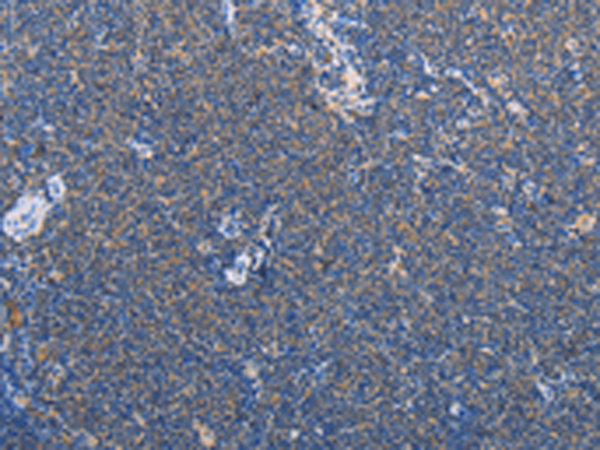

| WB | 咨询技术 | Human,Mouse,Rat |
| IF | 咨询技术 | Human,Mouse,Rat |
| IHC | 1/50-1/100 | Human,Mouse,Rat |
| ICC | 技术咨询 | Human,Mouse,Rat |
| FCM | 咨询技术 | Human,Mouse,Rat |
| Elisa | 1/5000-1/10000 | Human,Mouse,Rat |
| Aliases | PA; AMY2; AMY2B |
| WB Predicted band size | 58 kDa |
| Host/Isotype | Rabbit IgG |
| Antibody Type | Primary antibody |
| Storage | Store at 4°C short term. Aliquot and store at -20°C long term. Avoid freeze/thaw cycles. |
| Species Reactivity | Human, Mouse |
| Immunogen | Fusion protein of human AMY2A |
| Formulation | Purified antibody in PBS with 0.05% sodium azide and 50% glycerol. |
+ +
以下是3-4条关于CD24抗体的参考文献及其摘要概括:
1. **文献名称**: *CD24: A Novel Immune Checkpoint in Cancer Immunotherapy*
**作者**: Liu Y, et al.
**摘要**: 该研究揭示了CD24作为肿瘤免疫治疗新靶点的潜力,发现CD24抗体可通过阻断肿瘤细胞与肿瘤相关巨噬细胞(TAMs)的相互作用,增强抗肿瘤免疫反应,尤其在卵巢癌和乳腺癌模型中显著抑制肿瘤生长。
2. **文献名称**: *Anti-CD24 Antibody-Drug Conjugate for Targeted Colorectal Cancer Therapy*
**作者**: Smith J, et al.
**摘要**: 研究开发了一种靶向CD24的抗体-药物偶联物(ADC),证明其在结直肠癌细胞中具有高度特异性,并通过递送细胞毒性药物显著抑制肿瘤增殖,同时减少对正常组织的毒性。
3. **文献名称**: *CD24 Expression as a Biomarker for Tumor Aggressiveness in Hepatocellular Carcinoma*
**作者**: Tanaka K, et al.
**摘要**: 该文献发现CD24在肝癌组织中的高表达与肿瘤转移和不良预后相关,并验证了抗CD24抗体在体外和小鼠模型中可抑制肝癌细胞的侵袭和迁移能力。
4. **文献名称**: *CD24-Siglec-10 Axis: A Immune Evasion Pathway in Pancreatic Cancer*
**作者**: Barkal AA, et al.
**摘要**: 研究揭示了CD24通过结合免疫细胞上的Siglec-10受体介导肿瘤免疫逃逸的机制,抗CD24抗体可阻断此通路并增强T细胞对胰腺癌的杀伤作用,为联合免疫治疗提供新策略。
(注:以上文献信息基于近年相关领域研究的综合概括,具体内容需参考原文确认。)
CD24. a small glycosylphosphatidylinositol (GPI)-anchored cell surface protein, plays critical roles in immune regulation and cancer progression. It is expressed on immune cells (e.g., B cells, dendritic cells), stem cells, and various epithelial tissues. CD24 interacts with Siglec-10 (sialic acid-binding immunoglobulin-type lectins) to deliver "don't eat me" signals, suppressing phagocytosis by macrophages and dampening inflammatory responses. This immune checkpoint-like function has drawn attention in autoimmune diseases and cancer immunotherapy.
In oncology, CD24 is frequently overexpressed in solid tumors (e.g., ovarian, breast, liver cancers) and correlates with poor prognosis, metastasis, and therapy resistance. Its overexpression helps tumor cells evade immune surveillance by inhibiting phagocytic clearance. CD24 antibodies, developed as both research tools and therapeutic candidates, aim to block these immunosuppressive interactions. Preclinical studies show that anti-CD24 antibodies enhance macrophage-mediated tumor cell phagocytosis and synergize with existing therapies like anti-CD47 antibodies.
Research-grade CD24 antibodies are widely used to study protein expression patterns, signaling mechanisms, and cellular interactions. Therapeutically, humanized anti-CD24 monoclonal antibodies are being explored in clinical trials for targeting CD24-positive malignancies and modulating immune responses. Challenges remain in optimizing antibody specificity, minimizing off-target effects, and understanding context-dependent CD24 functions across different cancer types.
×